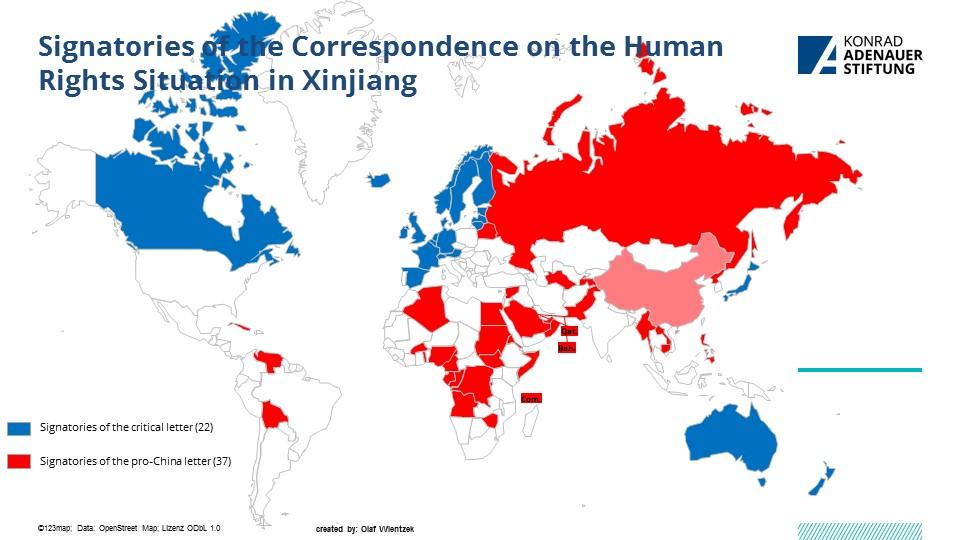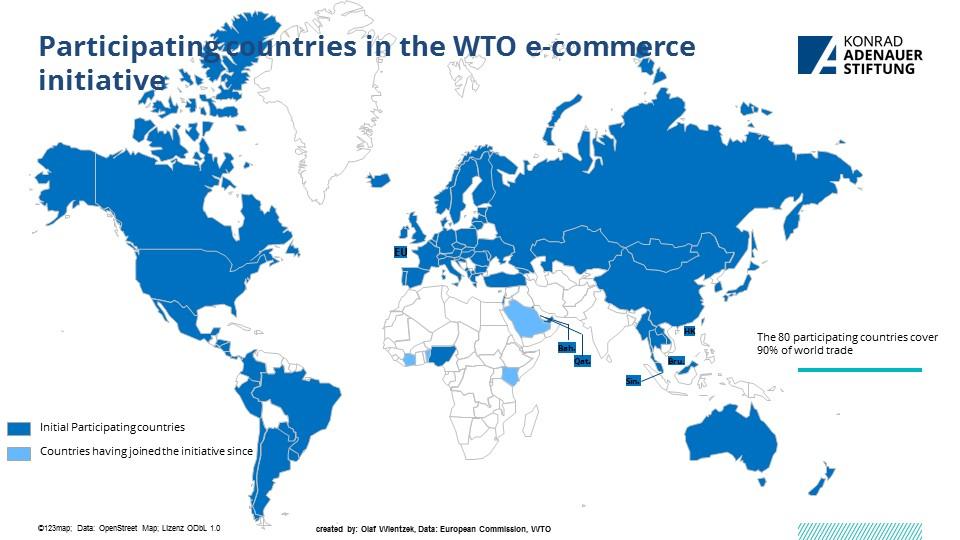At irregular intervals, the “Geneva Barometer” is casting a look at selected developments in the Geneva-based international organizations.
Global health: crises, controversies, geopolitics
Positive as well as worrying developments were on the agenda of this year’s World Health Assembly (WHA) from May 20 to 28 and in which Federal Minister of Health Jens Spahn participated (1): on the one hand encouraging developments in many countries in terms of universal health coverage and the fight against diseases like malaria and other hand facing the smoldering crisis of Ebola in the DR Congo.
In view of the Ebola crisis, the WHA decided on a vaccination offensive and appointed the US-American David Gressly as coordinator for the UN activities related to the fight against the crisis, among others with the goal of improving the security situation of the local health staff. Another goal is the mobilization of the urgently needed financial resources. The Federal government pledged additional 10 million Dollar at the margins of the WHA. Ebola remains an urgent issue: On July 17, the WHO declared the Public Health Emergency of International Concern (PHEIC) permitting more comprehensive measures and at the same time sending a clear warning signal to the international community to strengthen its financial commitment. August 1 marked the first anniversary of the outbreak of the epidemic in the DRC.
Furthermore, (geo) political conflicts surrounded the discussions at the WHA: On the one hand, China again prevented the granting of an observer status at the Assembly to Taiwan. On the other hand, fierce debates happened between the USA and some Latin-American states in opposition to Venezuela. Like in previous years, a controversial resolution on the health situation in the Palestinian territories and the Golan Heights was submitted which was directed against Israel.Germany was one of the eleven countries to reject the resolution.
Heated debates were caused by the initiative on the increase of transparency on costs of medicinal products which was submitted by Italy and supported by many countries from different continents. Critics of the resolution, mainly Great Britain and Germany, pointed to possible negative consequences on research and development. After tough negotiations, a toned-down version of the resolution was approved. However, Great Britain, Germany and Hungary “dissociated“ themselves from it: They i.a. criticized the intentional non-inclusion of the EU countries skeptical to the resolution on the part of the initiator Italy and the pressure used on some negotiators by spreading partly unfounded rumors about the state of the negotiations in the social media.
The future of work – 100 years ILO – ray of hope for multilateralism
This year the International Labor Organization (ILO) celebrated its 100th anniversary. During the almost two weeks of the annual ILO conference (June 10 to 21) apart from the anniversary celebrations, the conference which is composed of member states and social partners wanted to demonstrate that the international community is capable of agreeing on common positions despite all crises. In concrete terms, two central documents were adopted: a common declaration of symbolical importance, the “ILO Centenary Declaration for the Future of Work“ (2) claiming among others the extension of social protection systems, the promotion of sustainable and inclusive growth, but also the self-commitment to measures of promoting life-long learning in order to find efficient answers to the changes in the labor market. Until a few months before the conference, it was unclear whether such a declaration could be achieved. In the end, in particular employers and employees were struggling with the exact wording until the final days of the conference. In addition, a new ILO convention on preventing violence and harassment at work was decided. The prize to be paid for the consensus on the adoption of the convention was however the avoidance of some controversial themes (like issues related to LGBT rights). Against the trend in many other international organizations, a moderate budget increase was approved for the ILO.
In general, the conference signaled clear political support for multilateralism: 34 heads of state and government, among them Federal chancellor Angela Merkel, the French president Emmanuel Macron and the then British Prime Minister Theresa May addressed the conference. The German chancellor acknowledged the work and the merits of the ILO, among others in combating child labor, and pleaded for high global social standards.
Such a strong and concentrated presence of “first rank“ politicians is not a common picture in Geneva. Germany and France contributed essentially to the conciliatory end of the conference: without their common positioning, there would probably not have been a declaration at all. During the negotiations, the German negotiator from BDA (Confederation of German employer’s associations) played an important role. In general, the EU countries at the ILO were united; observers praised the relatively successful coordination efforts.
Human rights Council - more than ‘business as usual’
At the 41st session of the Human Rights Council (June 24 to July 12), a considerable number of dossiers were on the agenda, for instance, the situation in Syria, Eritrea, Belarus, Myanmar, and the Philippines, the conflict in Eastern Ukraine as well as the issue of the rights of the children. Many of the themes have been known for a long time, like the regular exchange of blows under the so-called “Item 7“ dealing specifically with Israel. Several UN special rapporteurs submitted their reports, including Diego García-Sayán re-sponsible for the independence of judges and lawyers. Particular attention was given to the report of the special rapporteur on extra-judicial executions Agnès Callamard concerning the murder of the Saudi journalist Jamal Khashoggi (3): In clear words, she accused Saudi Arabia of hav-ing committed the murder which was strongly opposed by the Saudi diplomatic representatives. Controversial was also a resolution on the protec-tion of human rights in the Philippines which eventually was adopted with a short majority.
Special mention should be made of the confron-tation related to the situation in the Chinese province of Xinjiang. Thus, on July 10 an excep-tional step was taken by 22 states writing a letter to UN High Commissioner for Human Rights Michelle Bachelet expressing concern about the human rights situation in the province Xinjiang, particularly related to mass arrests and the treatment of Muslim Uyghurs (4). Among the signa-tories were 15 of the 28 EU countries, including Germany, France and Great Britain (map I) as well as Canada, Japan, Australia, and Switzerland. China rejected the accusations sharply. Only two days later, another letter was sent signed by 37 countries praising expressly the progress made by the Chinese government in dealing with the Uyghurs. That letter was signed by countries like Russia, Algeria, Saudi Arabia, North Korea, Cuba, and Sudan. It was striking that:
among the 37 signatories (5) who took the side of China, ten were ranked as „partly free“ and 27 as „ not free“ by Freedom House;
no EU country had signed the support letter for China, however only the three Baltic states among the countries linked by the 17+1 (formerly 16+1)-initiative had signed the critical letter of the 22;
among the signatories of the letter of the 37 there are many majority Muslim countries, apart from Saudi Arabia also Qatar and the United Arab Emirates.
Germany is again applying for membership in the UN Human Rights Council for the period of 2020-2022. The elections will take place on October 2019 in New York.
Personnel – positions for German and Russian representatives
The Russian Tatiana Valovaya was elected direc-tor-general of the UN representation in Geneva (UNOG) and replaced the Danish incumbent Mi-chael Moller. For Russia, the appointment to the position had been a central concern. Valovaya‘s predecessor was known for his impartial attitude and for granting generous access to the media and civil society to the UN. It remains to be seen how the new leader of UNOG will interpret her mission.
Gerhard Adrian, the president of the German weather service, was elected president of the World Organization for Meteorology. He won against the US representative Louis Uccellini. Both candidates were highly qualified. Contrary to his US competitor, Adrian has a critical view of the privatization of weather services. Apart from the united European support, the election was won thanks to the support of the so-called “African group”.
Trade – few new developments at WTO - reform, concern about world trade
No real progress was made at the complicated discussions around the WTO reform. This was again obvious at the session of the General Council of WTO at the end of July. Observers and diplomatic representatives note that there is little movement in the central questions of dispute and are skeptical that an agreement about the reform of the Appellate body could be achieved before the US elections in 2020. In the meantime, it can be expected that at the end of the year when the mandate of two further members will terminate, the body it will no longer be able to take decisions. Different solutions for its replacement or transition periods are being discussed at the moment. Thus, the EU and Canada agreed on July 25 on an interim appeal procedure among themselves (based on article 25 of the WTO Dispute Settlement Understanding (DSU).(6)
The US criticism over the last few weeks focused increasingly on China which still benefits from the status of a “developing nation“ at the WTO. It should be noticed that recently the USA won some important cases at WTO – among others against China, which proves that the WTO is also a pertinent forum for major players in world politics.
At least the initiative on electronic trade is making progress. 80 countries have already joined it covering 90 % of world trade (map II). The difficult negotiations on fishery subsidies are moving forward, too. It is yet uncertain whether they can be concluded by the end of the year.
Furthermore, the trade dispute between Japan and South Korea was in the centre of debates at the General Council of WTO. Subsequently, both countries decided to delete each other mutually from the „white list“ of preferential trading part-ners. The background is among others a dispute about the compensation of forced laborers from Korea during the Japanese occupation.
The general development of world trade is a matter of concern. Its dynamism has slowed down noticeably. The reasons for it are the trade dispute between the USA and China and the worldwide increase of restrictive measures to trade. On July 26, the WTO published its annual report on statistics of world trade – with very different trends: whereas the development in the area of commodity trading is less encouraging, trading in services is growing steadily.(7)
Talks on INF-disarmament treaty without result
The recent talks between Russia and the USA end of July in Geneva ended again without results: on August 2nd, the withdrawal of the USA from the INF treaty took effect. The reason given was the permanent non-respect of the treaty by Russia. Already in 2013, the USA had expressed reserva-tions about Russia and called for the respect of the treaty.(8)
Reports on future challenges - migration, innovation, climate
On June 19, the UNHCR (Office of the United Nations High Commissioner for Refugees) pub-lished its recent report on global refugee trends in 2018.(9) In total, 70,8 million people had been on the move at the end of 2018, 58,3% of them were internally displaced. Most of the refugees stay in their region, close to 80% find refuge in a neighboring country of their country of origin.
On July 24, the World Intellectual Property Organ-ization (WIPO) presented the global innovation report together with the research institutes of INSEAD and Cornell.(10) Switzerland is again at the top of the list of the 129 countries examined, followed by Sweden and the USA. Germany is again taking the 9th position. Among the TOP 10, there are six EU countries in total. There is a noticeable good positioning of some transition countries (Vietnam ranks 42, Ukraine 47, Georgia 48) and a weak positioning of some financially strong Arab countries (Qatar ranks 65, Saudi-Arabia 68 and Bahrain 78).
The serious consequences of overuse of land and its impact on global warming above 1,5 degrees for instance on world nutrition are described in a report presented by IPCC, the Intergovernmental Panel on Climate Change, on August 7.(11) As coun-termeasures, the report mentions among others a reduction of emissions, investments in reculti-vation and new methods and technologies for improving land use and avoiding food waste.
Commentary
China fills the gap. The increasing importance of the role of China in Geneva can be seen in various aspects: one example is the repeatedly successful strategy for the marginalization of Taiwan in the framework of the WHA. Another example is the tendency to impose its under-standing of multilateralism and its sovereignty over the interpretation of controversial themes. The exchange of letters at the Human Rights Council on the situation in Xinjiang is a good ex-ample of this trend where China has repeatedly imposed its position in this body. A similar trend can be observed in relation to the occupation of major positions in different organizations. Peking often converts its economic influence in several states into political leadership. At the same time, China fills financially and personally gaps which were left by the United States in some (although not all) international organizations.
Will the African group tip the scales in the future? It is remarkable that the “African group“ has increasingly become an important actor – not only but also in Geneva. It is striking that in con-troversial questions some of its countries are backing the position of China. In other questions, however, the group acted as an important ally of the Europeans. Although the African group is certainly not a monolithic bloc related to content and strategy, it is remarkable that the group with its voting power can make a difference in some questions.
The urgency of a stronger (and faster) Euro-pean coordination. In preparation of meetings, there is generally thorough coordination between the EU states which often – but not always – leads to a coherent EU position (for instance at the WHA). In personnel matters, the previous coor-dination is noticeably slower and sometimes more difficult. Even diplomatic representatives from other region express occasionally their surprise at the labored coordination between EU countries on personnel matters.
Multilateralism is not dead. In contrast to what can be assumed by listening to the swan songs to the multilateral order, multilateral action has been a cumbersome exercise for several decades. It is true that in many political areas the global environment has become much more difficult. However, the ILO conference demon-strated that the global community is still able to agree on common – although general – positions. This will be even more necessary in the future: the reports on migration and climate indicate clearly that the lack of ability to find multilateral (and not only European) answers to global chal-lenges jeopardizes the achievement of many of the sustainability goals contained in the Agenda 2030.
[1] A detailed report on the World Health Assembly (crises, controversies, „milestones“) can be found under : https://www.kas.de/laenderberichte/detail/-/content/krisen-kontroversen-meilensteine
[2] ILO (21. Juni 2019): ILO Centenary Declaration for the Future of Work: https://www.ilo.org/wcmsp5/groups/public/ed_norm/relconf/documents/meetingdocument/wcms_711674.pdf
[3] Link to the report: https://www.ohchr.org/en/NewsEvents/Pages/DisplayNews.aspx?NewsID=24713&LangID=E
[4] List of signatory countries (published on ): https://www.hrw.org/sites/default/files/supporting_resources/190708_joint_statement_xinjiang.pdf
[5] List of signatories (published on HRW): (veröffentlicht auf HRW): https://www.hrw.org/sites/default/files/supporting_resources/190712_joint_counterstatement_xinjiang.pdf
[6]Text of the agreement between EU and Canada, Interim Appeal Arbitration under Article 25 of the DSU : https://trade.ec.europa.eu/doclib/docs/2019/july/tradoc_158273.pdf
[7] World Trade Statistical Review 2019: https://www.wto.org/english/res_e/statis_e/wts2019_e/wts2019_e.pdf
[8] Find here a list of the respective calls since 2013: https://geneva.usmission.gov/2019/07/31/timeline-of-highlighted-u-s-diplomacy-regarding-the-inf-treaty-since-2013/
[9]https://www.unhcr.org/statistics/unhcrstats/5d08d7ee7/unhcr-global-trends-2018.html
[10] See the full ranking here: https://www.globalinnovationindex.org/gii-2019-report
[11] IPCC: Climate Change and Land: https://www.ipcc.ch/site/assets/uploads/2019/08/4.-SPM_Approved_Microsite_FINAL.pdf
Topics
Provided by
Multilateral Dialogue GenevaAbout this series
The Konrad-Adenauer-Stiftung is a political foundation. Our offices abroad are in charge of over 200 projects in more than 120 countries. The country reports offer current analyses, exclusive evaluations, background information and forecasts - provided by our international staff.







You need to sign in in order to comment.